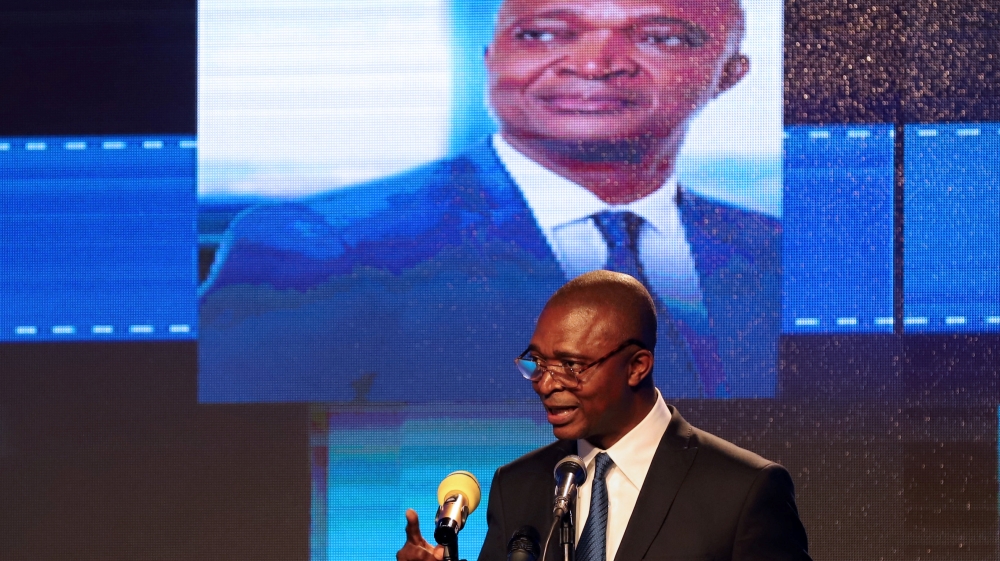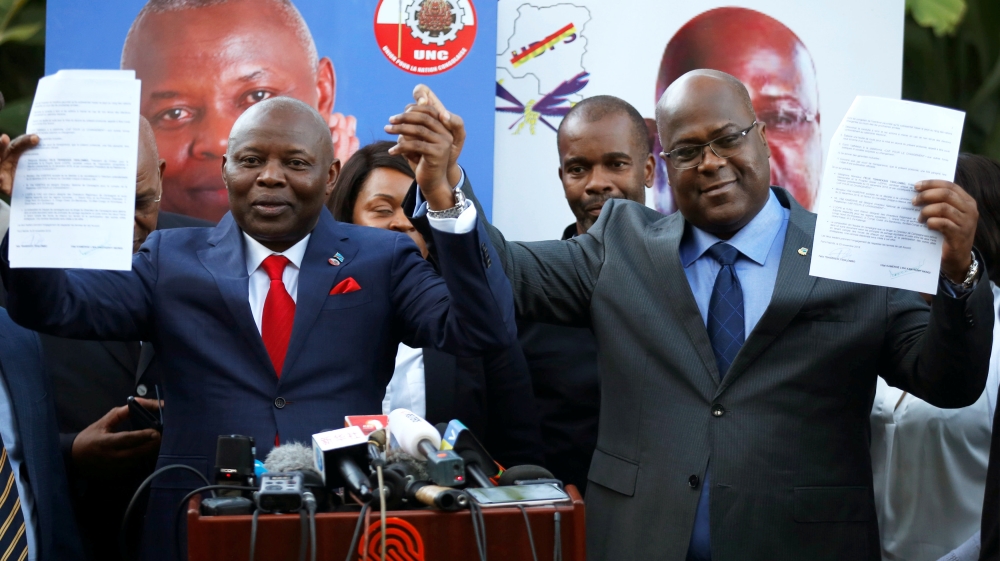With a month to key elections, ‘difficult times ahead’ for DRC
The long-delayed and long-awaited race for the Democratic Republic of Congo’s (DRC) presidency shifted into a new gear this week with the official launch of the candidates’ electoral campaigns.
Exactly a month from now, some 40 million people, about half of the resource-rich country’s population, are expected to finally elect a new president after two years of postponements, uncertainty and turmoil.
Outgoing President Joseph Kabila has controversially remained in office even though his second consecutive and final constitutional term officially expired in 2016. While Kabila insisted the election delays were due to challenges enrolling millions of voters and financial constraints, his refusal to step down led to the opposition accusing him of trying to cling to power and sparked violent rallies in which dozens of protesters were killed.
The DRC has not has a peaceful transfer of power since independence from Belgium in 1960, and there are still several questions over how the upcoming polls will be conducted – from logistical and financing difficulties to various threats to peace and security, including militia violence and a deadly Ebola outbreak in the country’s east.
Still, electoral officials maintain that the vote will go ahead as planned on December 23, when at least 20 candidates will vie to succeed Kabila.
Among them is Emmanuel Ramazani Shadary, a die-hard Kabila loyalist who was chosen at the 11th hour as the candidate for the outgoing president’s recently-minted electoral coalition, the Common Front for Congo (FCC).
Surprising but ideal pick?
Kabila’s choice of Shadary took most – including many in the FCC – by surprise. A largely unknown political figure in the vast country, Shadary has meagre finances and no independent power base. The 57-year-old is also under European Union sanctions for his role in the repression of deadly anti-Kabila protests in 2016, when he was an interior minister, and is seen as someone with extremely limited ties to the international community.
“These are all factors that would significantly disadvantage a candidate for high political position in the DRC,” says John Mukum Mbaku, nonresident senior fellow at the Brookings Institution in Washington, DC.
But it’s these exact factors, coupled with his hard-core loyalty, that likely “endeared” Shadary to Kabila and made him “a perfect choice” for the outgoing president’s potential political ambitions, Mbaku adds.
 |
| Emmanuel Ramazani Shadary at the launch of his election manifesto in Kinshasa [Kenny Katombe/Reuters] |
Indeed, some observers see Shadary’s choice as a deliberate move by Kabila to create “a new political class”, one that will remain under his control and loyal to him, even as he steps down from the presidency after 17 years.
“For the last years, we see an alienation between Kabila and the pillars of his regime. He had a strong team around him in the first decade of his reign, but for different reasons, these people disappeared,” says Kris Berwouts, a political analyst and DRC commentator.
“Over the last two-three years, Kabila has tried to create new leaders – people who do not have their own electoral base, no international network, no considerable financial means to deploy; people who are basically indebted to him. Ramazani Shadary is one of them.”
Kabila’s moves
Analysts say Shadary’s anointment was only the last in a series of moves by Kabila to secure his political future and interests before the August 8 announcement that he would not seek a third term – a decision he took amid increasing regional and international pressure.
Firstly, Kabila got the National Assembly to pass a law granting immunity to former presidents for crimes committed while in office, as well as providing them with a permanent security detail and a residence at the expense of the state. Secondly, he packed the federal bureaucracy, including the judiciary and the military, with loyalists. Thirdly, at Kabila’s request, the People’s Party for Reconstruction and Democracy (PPRD), the FCC’s biggest and most influential group, created the post of the president, which he is expected to hold after leaving office. Finally, Kabila – who will be a senator-for-life, as per the constitution – will also remain the FCC’s leader.
 |
| Kabila has been the DRC’s president since 2001 [Kenny Katombe/Reuters] |
Along with these safety and legal guarantees, Berwouts says Kabila wanted to “remain influential in [the DRC’s] politics and economically active. In the last years, he has purchased a lot of land, for instance”.
Mbaku, who is also a professor of economics at Weber State University, says these moves ensure that Kabila will be able to retain significant political influence, while remaining “the power behind the throne” and hence not having “to fear any retribution from a hostile regime”.
“Of course, given the fact that Kabila is eligible to return in 2023 and compete for the presidency, he may have chosen loyalist Shadary to keep the presidential ‘seat’ warm for him until he returns in 2023,” he adds.
Fractured opposition
Such a scenario would mark an audacious comeback for Kabila, who took power in 2001 after the assassination of his father, Laurent-Desire Kabila, who had forced out Mobutu Sese Seko, an authoritarian president who led for decades a corrupt, brutal, and dysfunctional government.
Joseph Kabila went on to win elections in 2006 and 2011, but both polls were marred by accusations of widespread fraud.
Next month’s vote will be conducted in a first-past-the-post system, which means, in theory at least, that a win by Kabila’s hand-picked successor is not a foregone conclusion if the vote is free and fair – especially when considering Shadary’s low public profile and widespread grievances over poor services, chronic financial mismanagement and corruption.
Despite its huge natural resources endowments – the DRC is the world’s top miner of cobalt and Africa’s leading copper producer – the country is mired in grinding poverty and several humanitarian and economic crises.
“Congolese people, especially those who reside in the urban areas, are quite frustrated with their extremely poor living conditions, which have not improved since the dictator Mobutu was ousted in 1997,” says Mbaku.
“They continue to complain about high rates of unemployment, lack of decent and affordable housing, inability of the poor to have effective access to basic healthcare and opportunities for education and job training.”
In what was seen as a major drive to give the traditionally fractured opposition a fighting chance in the upcoming polls, seven key DRC political leaders met earlier this month in the Swiss city of Geneva to select a joint candidate.
At the time, Felix Tshisekedi and Vital Kamerhe were seen as the likely figures to unite and lead the anti-Kabila front. But after several days of negotiations under the auspices of the Lamuka Coalition, the opposition heavyweights announced Martin Fayulu, a member of parliament with a lot of grassroots credibility in the capital, Kinshasa, as their alliance’s flag-bearer.
Barely 24 hours later, this rare instance of opposition unity was shattered. Tshisekedi, son of the late opposition leader Etienne Tshisekedi, withdrew his signature from the agreement after protests by his supporters in Kinshasa. Kamerhe followed him just a few hours later.
“The attempt to create a common platform with a joint candidate was, of course, very ambitious,” says Berwouts, author of Congo’s Violent Peace: Conflict and Struggle since the Great African War.
“The fact that two of the seven leaders who signed the agreement withdrew their signature 24 hours later was a major blow and affected the credibility of the opposition as such.”
Still, the other members of the coalition have continued to support Fayulu’s candidacy while also hoping to broaden their alliance by joining forces with civil society groups and working together with the influential Catholic Church.
Meanwhile, Kamerhe announced on Friday that he was throwing his support behind Tshishekedi, in a move that has created a second opposition bloc to Shadary’s candidacy.
“This is the winning ticket,” Kamerhe told reporters alongside Tshisekedi in Kenya’s capital, Nairobi.
An opinion poll last month showed Tshisekedi well ahead in the race, with 36 percent. Kamerhe (17 percent) and Shadary (16 percent) followed, while Fayulu’s projected share of the vote stood at eight percent.
 |
| Vital Kamerhe (left) and Felix Tshisekedi (right) at a joint news conference in Nairobi [Baz Ratner/Reuters] |
Voting machines, bias allegations
The race, although crowded, is still marked by the absence of leading opposition figures who have been prevented from taking part in the elections.
Key among them are Moise Katumbi, a wealthy businessman and a popular ex-governor who says he was prohibited from entering the country and file his candidacy in time; and Jean-Pierre Bemba, a former vice president who did manage to register after being acquitted of war crimes charges by the International Criminal Court in June but saw his candidacy later disqualified by election officials.
|
UNICEF: Two million children in DRC are acutely malnourished |
Opposition figures and international observers meanwhile have expressed concern over the use for the first time of a new electronic voting system, saying it is more vulnerable to vote-rigging than traditional ballots.
Electoral officials have dismissed the criticism, saying the use of the 106,000 South Korean-made touchscreen voting machines are meant to slash both election costs and the waiting period for results.
Critics also accuse the government, which has refused all forms of international assistance to carry out the elections, of controlling public debate to silence dissent in the lead-up to the vote and refusing access to any potential watchdogs.
In a statement on Wednesday, Amnesty International said election campaigning will take place in a “hostile political environment” that leaves little room for the DRC’s citizens “to freely and safely exercise their human rights”.
“The authorities have shown outright bias and selectivity in allowing the ruling party’s public rallies while cracking down on dissent, rallies and protests by the opposition supporters and critics of the government,” Joan Nyanyuki, the rights group’s director for East Africa, the Horn and the Great Lakes, said.
Looking ahead, Mbaku expects the next few weeks to be dominated by efforts by the ruling coalition to “demonise the opposition and enhance Shadary’s ability to win the election”.
He also warns of “serious violence” in the case the government mishandles the election amid opposition anger over the expected “domination of the airwaves by the FCC and their candidate”.
Amidst this climate, Berwouts says he expects “difficulties” for opposition candidates eager to rally support in the coming weeks.
“The chances on free and fair elections are nil,” he says. “If elections are postponed, there will be violent protests, and if they take place, there will be violence too – and the results will be contested in all scenarios.
“Congo has some difficult weeks and months ahead.”




